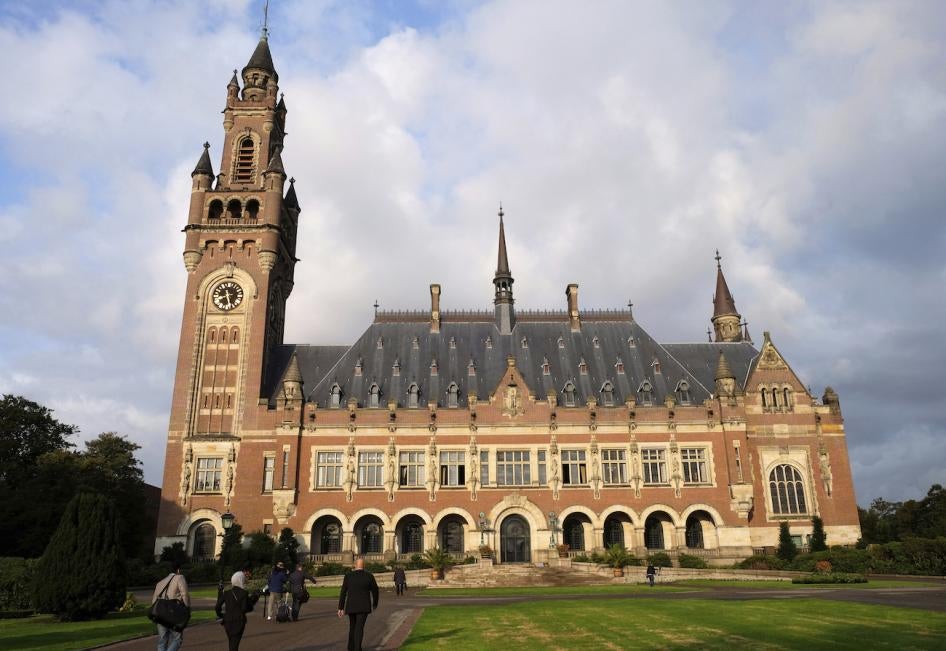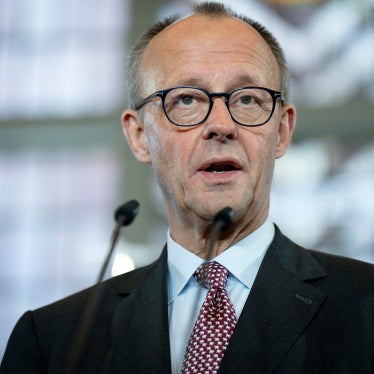(The Hague) – The International Court of Justice (ICJ) hearings on January 11 and 12, 2024, on genocide in Gaza will include the first formal response by Israel before an independent and impartial court to allegations of atrocities against the Palestinian people since October 7, 2023, Human Rights Watch said today. On December 29, South Africa filed a case with the court alleging that Israel is violating the 1948 Convention on the Prevention and Punishment of the Crime of Genocide.
On January 2, Israeli officials confirmed that Israel would be represented at the ICJ to oppose the South African government’s application. South Africa contends that Israel has violated the Genocide Convention by committing genocide against Palestinians in Gaza, and by failing to prevent it, including by not holding senior Israeli officials and others accountable for their direct and public incitement to genocide. The case is not a criminal proceeding against individuals but seeks a legal determination of state responsibility for genocide.
“South Africa’s case is about Israel’s obligations under the Genocide Convention and puts its conduct in Gaza in sharp focus before the United Nations’ highest judicial body,” said Balkees Jarrah, associate international justice director at Human Rights Watch. “South Africa has asked the World Court to issue urgent measures to protect Palestinians in Gaza who face catastrophic living conditions as a result of war crimes carried out by Israeli authorities.”
While the case may take several years to reach a final ruling, South Africa has asked the court to order provisional measures to protect the Palestinian people in Gaza from further harm, ensure Israel’s compliance with the Genocide Convention, and safeguard South Africa’s ability to have the case fairly adjudicated. South Africa has asked the ICJ to issue these measures “as a matter of extreme urgency,” saying that Palestinians in Gaza are in “urgent and severe need of the Court’s protection.” Arguments on the request for provisional measures are the subject of the January 11 and 12 hearings.
Among the provisional measures sought are for Israel to immediately suspend its military operations in Gaza and abide by its obligations under the Genocide Convention. South Africa also seeks measures to prevent the destruction and ensure the preservation of any evidence related to the underlying case – including by giving fact-finding missions, international mandates, and other bodies access to Gaza.
South Africa also asked the court to require Israel to report to it on steps taken to carry out a provisional measures order within a week of its issuance and then at regular intervals until the court issues its final ruling. In its oral arguments on January 11, South Africa could specifically ask the court to make Israel’s reports public.
In its application to the ICJ, South Africa says that Israel is killing Palestinians in Gaza in large numbers, causing them serious bodily and mental harm, imposing measures intended to prevent Palestinian births, and inflicting conditions of life calculated to bring about the destruction of Palestinians as a group. South Africa cited expulsions and mass displacement; deprivation of access to adequate food and water, medical care, shelter, clothes, hygiene, and sanitation; and the destruction of the fabric of Palestinian life in Gaza.
South Africa further contends that the “acts of genocide” should be placed in “the broader context of Israel’s conduct towards Palestinians during its 75-year-long apartheid, its 56-year-long belligerent occupation of Palestinian territory and its 16-year-long blockade of Gaza.”
South Africa contends that numerous statements by Israeli political and military officials amount to evidence of a clear intent to destroy Palestinians in Gaza as a group. It says that the “clear inference from the acts of the Israeli army on the ground…is that those genocidal statements and directives are being implemented against the Palestinian people.” South Africa’s application refers to several statements by UN experts who have warned of a risk of genocide.
The court will hear Israel’s formal response on January 12. Israel’s Foreign Affairs Ministry, in a published statement on December 29, 2023, described South Africa’s application as “blood libel” and that the claim “lacks both a factual and a legal basis and constitutes despicable and contemptuous exploitation of the Court.” One media report said that the Israeli Foreign Ministry instructed its diplomats to press officials in their host countries to issue statements against South Africa's case. The Israeli foreign minister has also specifically urged the United Kingdom to oppose South Africa’s application. The media reported on January 9 that UK Foreign Secretary David Cameron said that he did not think the ICJ case was helpful.
The United States National Security Council spokesman described South Africa’s application as “meritless, counterproductive, and completely without any basis in fact whatsoever.” The US State Department spokesman Matthew Miller said separately that Washington had not “at this point seen acts that constitute genocide” and that the ICJ case was “not a productive step at this time.”
A number of parties to the Genocide Convention have welcomed South Africa’s application including Bangladesh, Bolivia, Jordan, Malaysia, the Maldives, Pakistan, Palestine, Turkey, Namibia, Nicaragua and Venezuela. The Organization of Islamic Cooperation also issued a statement in support of the case. France’s UN ambassador in New York said France is a strong supporter of the ICJ and would back the court’s decisions. Governments should speak out in support of ICJ proceedings and publicly commit to supporting compliance with the court’s decisions, Human Rights Watch said.
Israeli authorities and Palestinian armed groups have committed serious abuses during the current hostilities. Hamas and other Palestinian armed groups deliberately killed hundreds of civilians in Israel on October 7 and took more than 200 hostages. The Israeli government then cut electricity, fuel, food and water to Gaza’s population and severely curtailed life-saving humanitarian aid, all acts of collective punishment, a war crime. Israeli authorities are also using starvation of civilians as a method of warfare in Gaza, which is also a war crime, Human Rights Watch said.
Past ICJ practice suggests that a decision on provisional measures could be delivered within weeks. Though such an order would be legally binding on Israel, it would not prejudge the merits of the allegations that Israel has violated the Genocide Convention. A provisional measures order is automatically sent to the UN Security Council pending a final decision in the case.
The ICJ is composed of 15 judges elected by the UN General Assembly and Security Council for nine-year terms. When two countries have a dispute and the court does not include their nationals on the bench, the governments can appoint ad-hoc judges to hear that specific matter. In this case, South Africa has appointed Dikgang Moseneke, former deputy chief justice of South Africa, and Israel has appointed Aharon Barak, a retired Israeli Supreme Court president, as ad-hoc judges.
South Africa, which ratified the Genocide Convention in 1998, brought its case under article 9 of the convention, which allows for disputes between parties to be submitted to the ICJ. The court previously confirmed that all member states of the convention have a duty to prevent and to punish genocide. Israel has been a party to the Genocide Convention since 1951.
South Africa together with Bangladesh, Bolivia, the Comoros, and Djibouti also referred the Palestine situation to the International Criminal Court prosecutor in November 2023. South Africa asked the prosecutor, Karim Khan, to investigate the crime of genocide among other grave abuses in Palestine with a view to charging the individuals responsible. Khan confirmed that his office has been conducting, since March 2021, an investigation into alleged atrocity crimes committed in Gaza and the West Bank since 2014, and that he has jurisdiction over crimes in the current hostilities between Israel and Palestinian armed groups that covers unlawful conduct by all parties. He visited Israel and Palestine in December.
In a related matter, in December 2022 the UN General Assembly requested an advisory opinion from the ICJ on the legal consequences of Israel’s prolonged occupation of the West Bank and Gaza. The General Assembly first asked the ICJ for an advisory opinion related to the Occupied Palestinian Territory 20 years ago. In 2004, the ICJ’s advisory opinion found that the route of Israel’s separation barrier violated international law and that it should be dismantled. The December 2022 request is wider in scope. South Africa, among other countries, filed a written statement in the proceeding. The ICJ will convene public hearings on the request starting on February 19.
“How many more alarm bells have to ring and how many more civilians must unlawfully suffer or be killed before governments take action,” Jarrah said. “South Africa’s genocide case unlocks a legal process at the world’s highest court to credibly examine Israel’s conduct in Gaza in the hopes of curtailing further suffering.”







